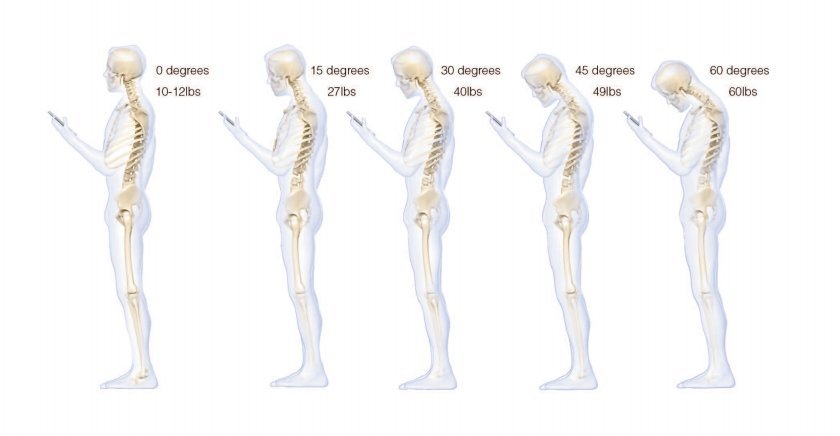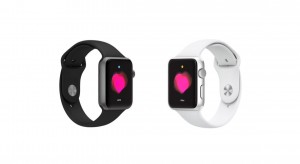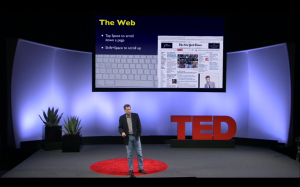 It’s fairly well known that sitting at a desk staring at a computer all day can be hazardous to your spine (see page 86 of Digital Planet), but new research suggests that standing with your smart phone can also cause problems. This short Huffington Post piece explains why.
It’s fairly well known that sitting at a desk staring at a computer all day can be hazardous to your spine (see page 86 of Digital Planet), but new research suggests that standing with your smart phone can also cause problems. This short Huffington Post piece explains why.
Tag: smart phones
 As one of the most innovative and profitable companies on the planet, Apple makes headlines when it makes announcements. This week Apple announced several important new products, each of which represents trends in a fast changing industry. Larger iPhones bridge the gap between smart phones and tablets. A mobile payments system designed to bypasses credit cards and protect privacy and security of users. And Apple’s long-awaited entry into the wearable computer market that has humbled several other companies. Technology writer Steven Levy’s thought-provoking piece for Medium suggests that the Apple watch may signal the beginning of a new, much more intimate type of interface between humans and their digital devices.
As one of the most innovative and profitable companies on the planet, Apple makes headlines when it makes announcements. This week Apple announced several important new products, each of which represents trends in a fast changing industry. Larger iPhones bridge the gap between smart phones and tablets. A mobile payments system designed to bypasses credit cards and protect privacy and security of users. And Apple’s long-awaited entry into the wearable computer market that has humbled several other companies. Technology writer Steven Levy’s thought-provoking piece for Medium suggests that the Apple watch may signal the beginning of a new, much more intimate type of interface between humans and their digital devices.
Every new technology brings controversy. This short video poetically confronts one of the most important questions of our digital age: If we’re always connected through our devices, will we lose more important connections with other humans?
Millions of people have viewed it online. Do you think it will make a difference in how they view their technological tools?
 Don’t look now, but your phone might be a looking glass that enables you to peer into a unique, irresistible fantasy world. Technologists and artists at Google and Motorola just introduced Windy Day, a free virtual reality interactive story that may represent a whole new form of narrative storytelling. And if you own a Moto X phone, it’s yours for free. Steven Levy tells the story behind the story in this Wired article.
Don’t look now, but your phone might be a looking glass that enables you to peer into a unique, irresistible fantasy world. Technologists and artists at Google and Motorola just introduced Windy Day, a free virtual reality interactive story that may represent a whole new form of narrative storytelling. And if you own a Moto X phone, it’s yours for free. Steven Levy tells the story behind the story in this Wired article.
wired.com/business/2013/10/motorola-google-mouse
 When Apple released the iPhone, the world changed. People were carrying powerful computers in their pockets and purses. Developers released a bevy of creative apps to harness that always-available computing power. Today it’s hard to imagine a world without smart phones. Could Google Glass, the wear-on-your-face computer from Google, be the beginning of the next revolution in personal computing? This short NPR story explains how early adopters plan to use their prototype high-tech specs.
When Apple released the iPhone, the world changed. People were carrying powerful computers in their pockets and purses. Developers released a bevy of creative apps to harness that always-available computing power. Today it’s hard to imagine a world without smart phones. Could Google Glass, the wear-on-your-face computer from Google, be the beginning of the next revolution in personal computing? This short NPR story explains how early adopters plan to use their prototype high-tech specs.
npr.org/blogs/alltechconsidered/2013/04/17/177557810/Seeing-The-World-Through-Google-Colored-Glasses
Of course, not everyone views Google Glass through such rose-colored lenses. This Saturday Night Live skit mocks the idea that Google Glass can be used discreetly; other detractors question our need to become even more dependent on our technology.
mashable.com/2013/05/05/snl-google-glass-parody/
 David Pogue is one of the most prolific–and entertaining–tech writers we know. In this short TED talk, he runs through a list of tips that can save you time every day. Don’t miss it.
David Pogue is one of the most prolific–and entertaining–tech writers we know. In this short TED talk, he runs through a list of tips that can save you time every day. Don’t miss it.
Rumors of a Facebook phone have rattled around the tech world for quite a while. Today Facebook announced not a a phone, but software that can convert many Android phones into Facebook machines. Facebook is available in app form on most smart phones. But the new Facebook Home software will replace the Android home screen with a Facebook-centered home, making it possible for social networkers to keep Facebook at the center of their phone experiences. Will Android phone users click Like?
http://www.wired.com/gadgetlab/2013/04/facebook-android-home-phone/?cid=6882274
If you’re tired of ads now, just wait ’til your smart phone gets a little smarter. It may soon deliver sales pitches to you based on your location, the weather, nearby friends, the contents of your last Facebook post, or just about anything else it can link to you. As your privacy slips away, your cash becomes an easy target for savvy tech companies.
huffingtonpost.com/bianca-bosker/the-age-of-continuous-consumption_b_1833454.html
Mike Daisey’s monologue on This American Life a few weeks ago fueled the firestorm of criticism of Apple for treatment of workers that make all those iProducts. There’s truth in many of the criticisms, but there are enough untruths in the monologue to cause the producers of this popular public radio program to devote an entire episode to exposing the real, fully factual story. This episode says as much about the ethics of journalism as it does about the ethics of manufacturing gadgets.
Will Your Phone Read Your Mind in 2016? Ask IBM
asmarterplanet.com/blog/2011/12/the-next-5-in-5-our-forecast-of-five-innovations-that-will-alter-the-landscape-within-five-years.html
As noted in Chapter 1’s Inventing the Future, predicting the future isn’t easy. But when the predictions are backed by one of the world’s biggest technology innovators, they’re worth considering. In this short, clever video, IBM describes and illustrates “5 in 5″— five technological breakthroughs that could reshape our lives within five years.